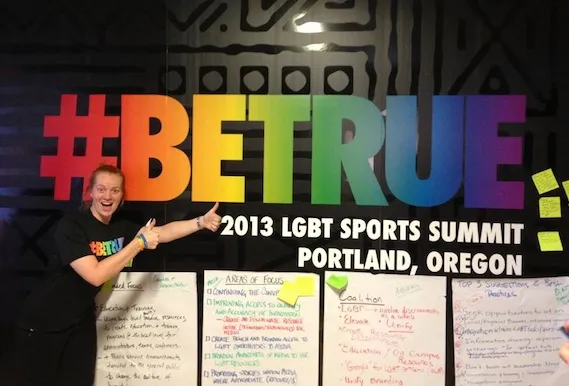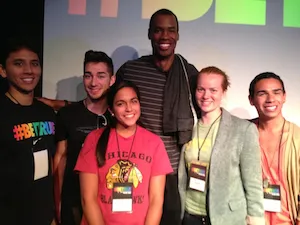Rose Pitkin '14 Tackles Discrimination in Athletics at LGBT Sports Summit

Rose Pitkin '14 recently joined fellow activists, organizers, coaches and athletes from around the country, including NBA center Jason Collins, in Portland, Ore., at the 2013 Nike LGBT Sports Summit. The mission: to end discrimination and bias in athletics by 2016.

Pitkin (second from right) with NBA center Jason Collins and LGBT student-athletes and allies.
"It was 100 percent representative of the greater sports world," says Pitkin, who plays third base for the Swarthmore softball team.
Pitkin, a neuroscience major from West Springfield, Mass., attended the summit as a representative of GO! Athletes, the first national network dedicated to educating, engaging, and empowering every generation of LGBTQ athletes and allies. She was joined by members of organizations such as You Can Play, It Gets Better Project, Athlete Ally, and the National Center for Lesbian Rights, all with a similar vision - equality for LGBT athletes and employees, from youth to professional sports.
Watch Pitkin reflect on her experiences at the summit:
Pitkin believes that LGBT athletes deal with the same issues and struggles that LGBT students on college campuses face. However, she also thinks that LGBT athletes face the additional challenge of feeling comfortable and opening up about their sexual orientation to their teammates.
"You go to practice every day with these people, and you have to trust your teammates," she says. "You have to work side by side with them every single day, and you have to build a relationship in order to be successful. Teams aren't going to win if they don't get along."
After emerging from three days of innovative and energized discussion, Pitkin hopes that Swarthmore students could follow the lead of the athletes and allies that she engaged with.
"One of the things that can be hard at a place like Swarthmore is that we have so many things to do," she says. "Everyone does 100 things." The key, she says, is to make connections between your relationships with friends, teammates, and classmates.

Pitkin with Fallon Fox, the first openly transgender mixed martial artist in MMA history.
In the end, Pitkin was most moved by the straight allies who were at the summit. Supporters who have not personally experienced harassment or do not identify as members of the LGBT community are equally as powerful players in the movement, according to Pitkin.
"It shouldn't be left to the people who have experienced it, and it's really easy to say, 'LGBT athletes, this is your problem, you deal with it,'" she says.
The conference concluded with a hefty list of initiatives, including the call for sensitivity training for all incoming NCAA varsity athletes, the adoption of a transgender-inclusion policy for college recreational sports, and media campaigns aimed at tackling harassment in college and professional sports, among several ideas.
For Pitkin, she left Portland more aware than ever of the importance of opening up to and trusting her teammates. If she wants to build lasting relationships with her teammates that will carry her through the grueling daily practices and long road games, Pitkin says, she needs to start by feeling comfortable being everything she is, both on and off the field.
"People say, 'Who cares about anything else, just play the sport,'" she says. "But when you have to hide a part of who you are, it's really hard to be successful. You can't just shut up and play."
However, Pitkin is confident that the summit's initial mission statement can be achieved. 2016 is approaching, and she's ready to get to work.



